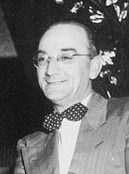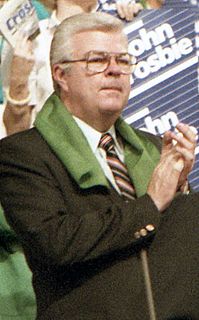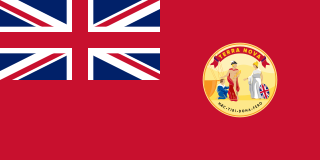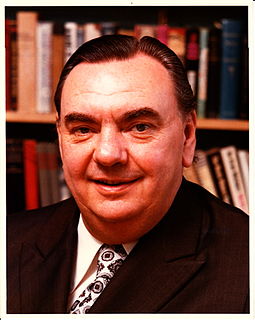National referendums are seldom used in Canada. The first two referendums in 1898 and 1942 saw voters in Quebec and the remainder of Canada take dramatically-opposing stands, and the third in 1992 saw most of the voters take a stand dramatically opposed to that of the politicians in power.

Joseph Roberts Smallwood was a Newfoundlander and Canadian politician. He was the main force who brought the Dominion of Newfoundland into Canadian Confederation in 1949, becoming the first premier of Newfoundland, serving until 1972. As premier, he vigorously promoted economic development, championed the welfare state, and emphasized modernization of education and transportation. The results of his efforts to promote industrialization were mixed, with the most favourable results in hydroelectricity, iron mining and paper mills.

The Liberal Party of Newfoundland and Labrador is a political party in the province of Newfoundland and Labrador, Canada. The party is the provincial branch, and affiliate of the federal Liberal Party of Canada. It has served as the Government of Newfoundland and Labrador since December 14, 2015. The NL Liberals were re-elected to a majority government in the 2021 provincial election.

The Progressive Conservative Party of Newfoundland and Labrador is a provincial political party in Newfoundland and Labrador, Canada. The party was founded in 1949 and most recently formed the Government of Newfoundland and Labrador from the 2003 general election until the 2015 general election. The party has served as the official opposition to the government of Newfoundland and Labrador since 14 December 2015. On 31 March 2021, MHA David Brazil was appointed interim leader.
The Newfoundland People's Party was a political party in the Dominion of Newfoundland before it joined Canada.

John Carnell Crosbie, was a Canadian provincial and federal politician who served as the 12th lieutenant governor of Newfoundland and Labrador, Canada. Prior to being lieutenant governor, he served as a provincial cabinet minister under Premiers Joey Smallwood and Frank Moores as well as a federal cabinet minister during the Progressive Conservative (PC) governments of Joe Clark and Brian Mulroney. Crosbie held several federal cabinet posts, including minister of finance, minister of justice, minister of transport, minister of international trade, and minister of fisheries and oceans.

The Dominion of Newfoundland was a country in eastern North America, today the modern Canadian province of Newfoundland and Labrador. It was established on 26 September 1907, and confirmed by the Balfour Declaration of 1926 and the Statute of Westminster of 1931. It included the island of Newfoundland, and Labrador on the continental mainland. Newfoundland was one of the original dominions within the meaning of the Balfour Declaration and accordingly enjoyed a constitutional status equivalent to the other dominions of the time.
The Responsible Government League was a political movement in the Dominion of Newfoundland.

Donald Campbell Jamieson, was a Canadian politician, diplomat and broadcaster.
Major Peter John Cashin was a businessman, soldier and politician in Newfoundland.

The Newfoundland National Convention of 1946 to 1948 was a forum established to decide the constitutional future of Newfoundland.
Charles H. Ballam was a Canadian union leader, officeholder and delegate at Newfoundland National Convention.
Newfoundland, as a British colony and dominion, held 29 general elections for its 28 Newfoundland House of Assemblies; the results of the second election in 1836 were set aside, and another election held in 1837.

Pleaman Wellington Crummey JP (1891–1960) was a public figure in the Dominion of Newfoundland and the Province of Newfoundland. He was born at Western Bay, Conception Bay.
Chesley Arthur "Ches" Crosbie was a Newfoundland businessman and politician.

The Economic Union Party was a political party formed in the Dominion of Newfoundland on 20 March 1948, during the first referendum campaign on the future of the country. The British-appointed Commission of Government had administered the country since the financial collapse of 1934. The alternatives were "responsible government", or "Confederation".

Prosperity returned to Canada during the Second World War. With continued Liberal governments, national policies increasingly turned to social welfare, including universal health care, old-age pensions, and veterans' pensions.

The Newfoundland Referendums of 1948 were a series of two referendums to decide the political future of the Dominion of Newfoundland. Before the referendums, Newfoundland was in debt and went through several delegations to determine whether the country would join Canada, remain under British rule or regain independence. The voting for the referendums occurred on June 3 and July 22, 1948. The eventual result was for Newfoundland to enter into Confederation.

The history of Newfoundland and Labrador covers the period of time from the arrival of the Archaic peoples, Prior to European colonization, the lands encompassing present-day Newfoundland and Labrador were inhabited for millennia by different groups of indigenous peoples.

The Canadian province of Newfoundland and Labrador is governed by a unicameral legislature, the House of Assembly, which operates under the Westminster model of government. The executive function of government is formed by the Lieutenant Governor, the premier and his or her cabinet. The politics of Newfoundland and Labrador is defined by a long history, liberal democratic political institutions and a unique political culture.











